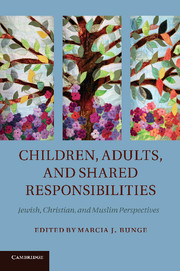Book contents
- Frontmatter
- Contents
- List of Contributors
- Acknowledgments
- Introduction
- PART I RELIGIOUS UNDERSTANDINGS OF CHILDREN
- Chapter 1 The concept of the child embedded in Jewish law
- Chapter 2 Children's spirituality in the Jewish narrative tradition
- Chapter 3 Christian understandings of children
- Chapter 4 Human dignity and social responsibility
- Chapter 5 Islam, children, and modernity
- Chapter 6 Muslim youth and religious identity
- Chapter 7 Imagining childism
- Chapter 8 Talking about childhood and engaging with children
- PART II RESPONSIBILITIES OF CHILDREN AND ADULTS
- Select bibliography
- Index of names
- Index of subjects
- References
Chapter 1 - The concept of the child embedded in Jewish law
from PART I - RELIGIOUS UNDERSTANDINGS OF CHILDREN
Published online by Cambridge University Press: 05 October 2012
- Frontmatter
- Contents
- List of Contributors
- Acknowledgments
- Introduction
- PART I RELIGIOUS UNDERSTANDINGS OF CHILDREN
- Chapter 1 The concept of the child embedded in Jewish law
- Chapter 2 Children's spirituality in the Jewish narrative tradition
- Chapter 3 Christian understandings of children
- Chapter 4 Human dignity and social responsibility
- Chapter 5 Islam, children, and modernity
- Chapter 6 Muslim youth and religious identity
- Chapter 7 Imagining childism
- Chapter 8 Talking about childhood and engaging with children
- PART II RESPONSIBILITIES OF CHILDREN AND ADULTS
- Select bibliography
- Index of names
- Index of subjects
- References
Summary
Judaism, a tradition that dates back to Abraham 3,700 years ago, has developed many resources to define the beliefs and actions that it would have Jews adopt. These include stories, proverbs, moral theories, images of God as our exemplar, prayer, study, and, most especially, law. This chapter focuses on what Jewish law tells us about how Judaism understands the child, and the next chapter, written by Rabbi Sandy Eisenberg Sasso, explores what Jewish lore tells us. Ultimately, Jewish law (halakhah) and lore (aggadah) continually interact, much as the body and soul of a human being do, and so our two chapters should be seen in tandem as two complementary ways to articulate a Jewish understanding of children and adults’ obligations to them.
Because this chapter will focus on Jewish law, it is important to note that both Judaism and Islam place more emphasis on law than most other religious traditions do, and that has some distinct advantages and disadvantages. Furthermore, contrary to Western (and especially the American) legal systems, Jewish law speaks not primarily of rights but rather of duties. Enlightenment documents, like the US Declaration of Independence, depicts me as an individual born “with unalienable rights”; in contrast, according to the Torah and other sacred Jewish texts, as a Jew I am born into a community that was given 613 commandments at Mount Sinai. Therefore to discern how the Jewish tradition perceives children and values them, we will look at the duties Jewish law imposes, first on parents (and, if they fail to fulfill them, on the community), and then on children.
- Type
- Chapter
- Information
- Children, Adults, and Shared ResponsibilitiesJewish, Christian and Muslim Perspectives, pp. 19 - 38Publisher: Cambridge University PressPrint publication year: 2012
References
- 1
- Cited by



